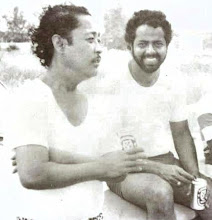

Former Education DGs Tan Sri Haji Murad bin Mohamed & Tan Sri Dr. Abdul Rahman Arshad were true educationists
Malaysian educationists such as the late Tan Sri Datuk Haji Murad backed by the then policy makers realized back in the 1980’s that the school curriculum had become too academic and wisely introduced music as a compulsory subject in all primary schools to offset the imbalance. The government fully backed this move and has thus far spent billions to put music study at all levels of education in Malaysia. Now after thirty years, the Ministry of Education is planning to cut time allocation for music in the school curriculum. This is something that needs to be reconsidered. One may ask why music education is now being given such a low priority ranking after nearly a quarter century of public music education.
The KBSR generation is now at least thirty years old and had been exposed to formal music education for at least six years. As a consequence we should see informed music appreciation and also an active and bubbling live music culture in Malaysian society? Sadly, this is not happening. It is well known that a tree is known by its fruit. Malaysian parents clearly do not see the “fruits of music education”. Desired outcomes of a well orchestrated music program in the primary schools should be such things as the ability to appreciate and talk intelligently about music in its variant forms.
So what do we do with a tree that does not bear fruit? Apparently questions such as these have begun to surface amongst education planners and in the mind of the Honorable Minister himself. Perhaps we might have been taking a wrong approach to music education all along? Perhaps focus should have been more on a sound music appreciation program of the “penyuburan diri” type rather than dreary theory and recorder drills so prevalent in many schools which non-musical music teachers prefer to do. There is a dearth of empirical studies on such matters which is within the purview of the so many universities that offer music studies even up to graduate levels in Malaysia today.
The government, children, parents and classroom music teachers are not at fault here. I feel that the fault lies squarely in the planning, administration and implementation aspects of music education since 1983 itself. Sadly, this aspect has always been in the hands bureaucrats and not professionals such as music educationists or those qualified in music education management. Even those with tertiary music qualifications who are put in charge of music education planning are not screened properly. For instance, when selections are made the background of the candidate's university or the transcripts are not looked into. The transcripts would show what subjects or courses were taken and of course the grades obtained by the candidate. The current and past practice allows anyone who shows a diploma (BA,MA or Phd) from overseas to be immediately allowed to hold any music education post that may not match his/her qualifications. For example someone who majored in piano or percussion may be put in-charge of curriculum development.
It is time for some serious reflection and rethinking on how we should approach music education to meet the desired aims and behavioral objectives. Cutting down “the music tree” is the not the wisest of things to do now simply because the study of music has so much to offer a child in personality development. It is hoped that the quality of music education implementation be investigated and improved instead. It must be remembered that a sound music education, directly benefits our children and is just as important as any other subject. Should it be reduced to just an educational frill?
A Cursory View of the Benefits of Music Education
1. Transmits the cultural heritage of a group to succeeding generations.
2. Helps students to achieve their full potential and be better citizens.
3. Helps students to wallow not only in popular music culture only but also opens doors to the
many other dimensions of joy that the study of music offers..........even for the non-musically
talented.
4. Brings a sensible balance to the curriculum (besides the two hemispheres of the brain) .
between the arts and science subjects.
5. Provides opportunities for success for some students who have difficulty with other subjects
6. Exalts the human spirit and enhances the quality of life.








































